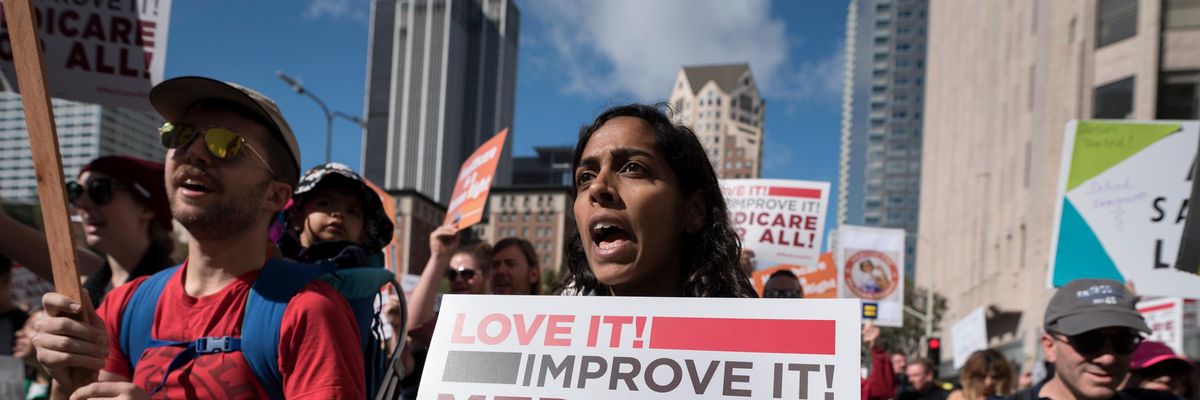MSNBC host Mehdi Hasan used his major-network platform on Sunday to make the case for Medicare for All as a critical public health measure, pointing to a new study showing that a single-payer system designed to guarantee comprehensive coverage to everyone could have prevented more than 338,000 coronavirus deaths in the United States.
"It's time to stop treating universal healthcare or single-payer or Medicare for All as some sort of fringe, left-wing issue, some political hobbyhorse for Bernie Sanders or 'The Squad,'" Hasan said during the three-minute segment. "No, it's a public health issue. It's a policy being pushed by some of the top scientific researchers in America. And frankly, it's a no-brainer."
Watch the full segment:
Last week, as Common Dreams reported, research published in the Proceedings of the National Academy of Sciences estimated that at least 338,594 lives could have been saved from Covid-19 in the U.S. if the country had a single-payer healthcare system. The coronavirus is still killing hundreds of people each day across the nation as tens of millions remain uninsured, often forgoing care out of fear of racking up debt.
The study's authors also found that a Medicare for All system could have cut $105.6 billion in national healthcare costs by reducing coronavirus-related hospital expenditures. The U.S. currently spends around twice as much on healthcare per person as other wealthy nations.
"If the United States wants to be ready for the next pandemic, we need to make sure everyone in America has healthcare."
"There are a number of reasons as to why our country has handled the pandemic so much worse than most other western countries," Hasan noted, citing "poor presidential leadership during the Trump era, the efforts of anti-vaxxer Republican governors, and media misinformation from the likes of Fox and Facebook."
"But we also need to talk about the elephant in the room: universal healthcare--or, our lack of universal healthcare," he continued. "Compared to other large high-income countries, the U.S. had the highest death rate per capita from the virus. And it's also the only one among such countries without universal healthcare."
Dr. Alison Galvani, director of the Center for Infectious Disease Modeling and Analysis at Yale School of Public Health and the lead author of the new study, applauded Hasan for providing a succinct explanation of "not only the crisis of our fragmented healthcare system but also the solution to improve pandemic preparedness, save lives and reduce costs."
"A must-watch," she added.
Hasan's segment aired just over a month after Sen. Bernie Sanders (I-Vt.) unveiled the latest version of his Medicare for All Act, legislation that would transition the U.S. to a single-payer system over a four-year period and provide every person in the U.S. with comprehensive health coverage for free at the point of service.
During his 2020 campaign, President Joe Biden repeatedly attacked Medicare for All and refused to commit to signing a single-payer bill if one reached his desk.
Noting that the Biden administration is expected in the coming weeks to release its strategy to defend against the next pandemic, Hasan said that "the adoption of universal healthcare should be fundamental to any plan for pandemic preparedness."
"If the United States wants to be ready for the next pandemic, we need to make sure everyone in America has healthcare," said Hasan. "No ifs, no buts, no exceptions."



